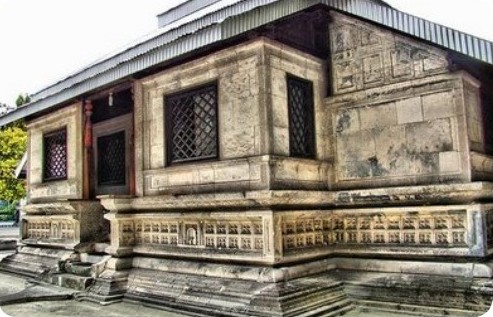The Maldives , officially the Republic of Maldives (Dhivehi Raa'jeyge Jumhooriyya), is a South Asian island country, located in the Indian Ocean, situated in the Arabian Sea. It lies southwest of Sri Lanka and India. The chain of 26 atolls stretches from Ihavandhippolhu Atoll in the north to the Addu City in the south. Comprising a territory spanning roughly 298 square kilometres (115 sq mi), the Maldives is one of the world's most geographically dispersed countries, as well as the smallest Asian country by both land area and population, with around 427,756 inhabitants. Malé is the capital and most populated city, traditionally called the "King's Island" for its central location.
The Maldives archipelago is located atop the Chagos-Maldives-Laccadive Ridge, a vast submarine mountain range in the Indian Ocean, which also forms a terrestrial ecoregion, together with the Chagos and the Lakshadweep. With an average ground-level elevation of 1.5 metres (4 ft 11 in) above sea level, it is the world's lowest country, with even its highest natural point being the lowest in the world, at 2.4 metres (7 ft 10 in). Due to the subsequent risks posed by rising sea-levels, the government pledged in 2009 to make the Maldives a carbon-neutral country by 2019.
The Maldivian archipelago took to Islam in the 12th century and consolidated as a sultanate, developing strong commercial and cultural ties with Asia and Africa. From the mid 16th-century, the region came under the increasing influence of European colonial powers, with the Maldives becoming a British protectorate in 1887. Independence from the United Kingdom was achieved in 1965 and a presidential republic was established in 1968 with an elected People's Majlis. The ensuing decades have been characterised by political instability, efforts at democratic reform, and environmental challenges posed by climate change.
The Maldives is a founding member of the South Asian Association for Regional Cooperation (SAARC)). It is also a member of the United Nations, the Organization of Islamic Cooperation, and the Non Aligned Movement. The World Bank classifies the Maldives as having an upper middle income economy. Fishing has historically been the dominant economic activity, and remains the largest sector by far, followed by the rapidly growing tourism industry. Along with Sri Lanka, it is one of only two South Asian countries rated "high" on the Human Development Index, with its per capita income the highest among SAARC nations.
